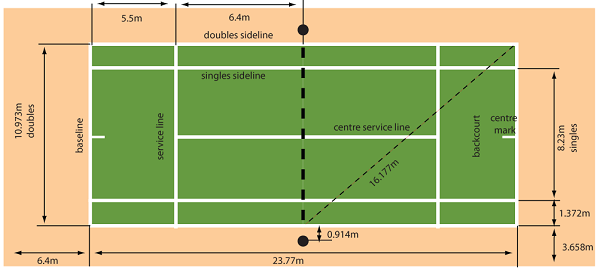Tennis – Playing Environment
Tennis as a sport was played outdoors for long time since its origin. The complete playing area was called lawn and the sport was fondly called as Lawn-Tennis. The court surface was either made of clay or grass. Gradually, the playing conditions and surface changed and the sport was played indoors too to avoid any sort of climatic interruptions.
As new tournaments emerged by late 20th century, the court surfaces also varied. For example, Wimbledon is a tournament played on grass court. French Open is played on clay court. US Open and Australian Open are played on hard surfaces. Paris Masters is another tournament that is played on carpet surface which is a removable court.
Dimensions of a Tennis Lawn
All tennis courts should be rectangular in shape. As the sport is played in different formats, Singles and Doubles; the breadth of the court varies with length unchanged. The lawn should have a length of 23.77 meters for all matches. However, the width in a singles match is 8.23 meters and 10.97 meters for a doubles match.
The court is divided into two equal halves with a net that is 0.914 meters high from the ground. A net is tied parallel to width of the court. There is a metal cable that holds the net tightly with two net posts on either ends of length. These posts are not movable hence; the courts for doubles and singles are different.
The lines drawn on wider ends of the court are called baselines and the ones on sides are called sidelines. There will be one baseline on each end and there are two sidelines parallel to each other. These are 1.37 meters apart. The first of these lines is called singles sideline and the parallel one is called doubles sideline.

Two lines are drawn parallel to net from singles sideline at 6.40 meters from net on each side. These lines are called service lines. In addition, the area between service line and net is divided into two equal halves with a line perpendicular to net and service line. It is called centre line. All the lines around court should be between 2.5 and 5 centimeters except the base line that is nearly 10 centimeters wide. The lines should have contrasting color.
